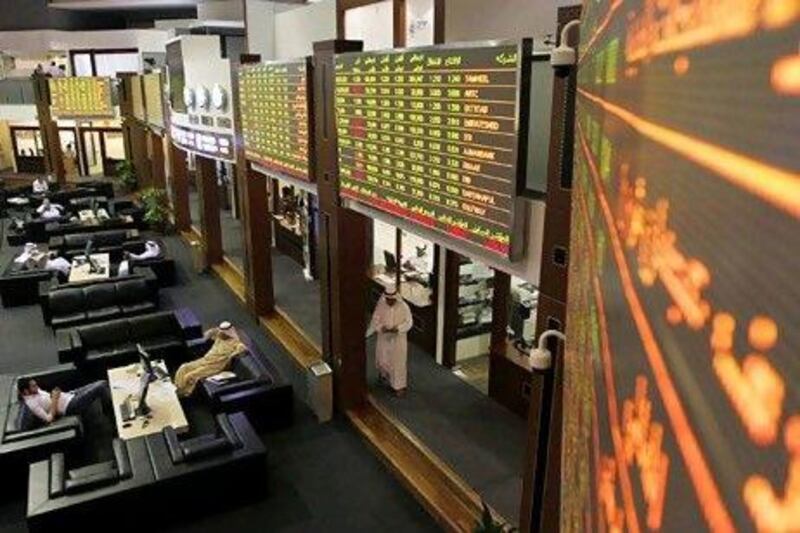Spain became the fourth euro member to seek a bailout since the start of the region's debt crisis more than two years ago with a request for as much as 100 billion euros ($125 billion) in loans to rescue its banking system.
"The 100 billion euros is the number that we were looking for so I'm cautiously optimistic," Olly Burrows, a credit analyst at Rabobank International, said. "We still have to find a solution to the sovereign debt crisis: it's not done yet and we still have to press on with the task of uniting Europe."
Just seven months after winning a landslide victory, the prime minister Mariano Rajoy was forced to abandon his bid to recapitalise Spanish banks without recourse to external help as a deepening recession forced lenders to recognise spiralling losses.
Concern about the banks, which are hobbled with more than 180 billion euros in problematic real estate loans and assets, drove Spanish borrowing costs to near euro-era records last month.
The economy minister Luis De Guindos announced the aid request yesterday after a three-hour conference call with his European counteparts. He said the terms of the rescue loans are "very favorable" compared with market rates.
The funds will be channeled through Spain's FROB bank rescue fund, and will add to Spain's debt, which was 68.5 per cent of gross domestic product last year.
Should Spain request the maximum amount, it would add about 10 percentage points to that number, and interest paid on the loans will affect the deficit, which is the euro-area's third-largest at 8.9 per cent of GDP.
Yesterday's move means Spain has a firewall in case the Greek election on June 17 unleashes a fresh round of market turmoil.
The yield on Spain's benchmark 10-year yield bond jumped after the government announced the nationalisation of Bankia Group last month, rising close to the euro-era high of 6.78 per cent on May 30. The yield has since slipped amid optimism that Rajoy would seek a bailout and was at 6.17 per cent on June 8.
European officials have failed to control a debt crisis that started in Greece at the end of 2009 and has now claimed the euro region's fourth-largest economy. The bailout adds to the 386 billion euros ($480 billion) in pledges to Greece, Ireland and Portugal that European governments and the International Monetary Fund have made since 2010.
The news comes after the IMF issued a warning that the UAE could be hit by a worsening situation in Europe.
"A marked spillover of the current crisis of peripheral euro countries into the core euro area and global financial markets could have major financial repercussions for the UAE and the GCC region," the IMF said in a report published on Friday.
The IMF said the situation in Greece threatened to affect the UAE economy, and warned that the number of non-performing loans at local banks could also rise this year.
"Although financial vulnerabilities of the United Arab Emirates have decreased since the 2008 global real estate collapse, given the UAE's interconnectedness, it remains exposed to global financial conditions," the IMF said.
Dubai was identified as particularly at risk. Greece is the main source of "contagion risk" for Dubai, the report added, and said three other European countries posed a risk. "Italy, Portugal, and Spain are also contributors: these four countries explain close to 80 per cent of the contagion risk to Dubai."
Paul Gamble, the chief economist and head of research at Jadwa Investment in Riyadh, agreed that the UAE was not immune to the financial woes of Europe.
"Greece poses a big risk to the world economy. And Dubai in particular is exposed to what is going on in the global economy," he said.
"You've gone through the worst, but the UAE economy is very much exposed to what is going on in the global economy," Mr Gamble added.
The UAE banking system is "moderately exposed" to the situation in Europe, but does not currently show any signs of distress, the IMF report said.
However, the number of non-performing loans (NPLs) is forecast by the IMF to rise.
"The number of NPLs is likely to increase this year, including those resulting from the ongoing restructuring of Dubai Holding … and the distressed real estate companies," the report said.
"The concentration of risk in a few banks indicates the need for close supervision of these banks," it added.
Mr Gamble agreed that the number of non-performing loans was on the rise. "It's natural that, as an economy slows, non-performing loans will increase," he said.
More than US$100 billion (Dh367.28bn) has been wiped off the value of UAE stock markets since the fall of the US investment bank Lehman Brothers in September 2008, the IMF said.
Market-capitalisation losses on the country's two main bourses totalled $102bn between September 2008 and the end of March this year, with companies listed in Dubai accounting for nearly 60 per cent of that.
Economists said the outlook for the UAE's stock markets was bleak.
"I'm not very optimistic about the outlook for the equity markets," said Jarmo Kotilaine, the chief economist of National Commercial Bank in Jeddah.
"Domestic growth drivers - even though they are better than they used to be - are still uneven and not particularly strong."
With Bloomberg
bflanagan@thenational.ae





